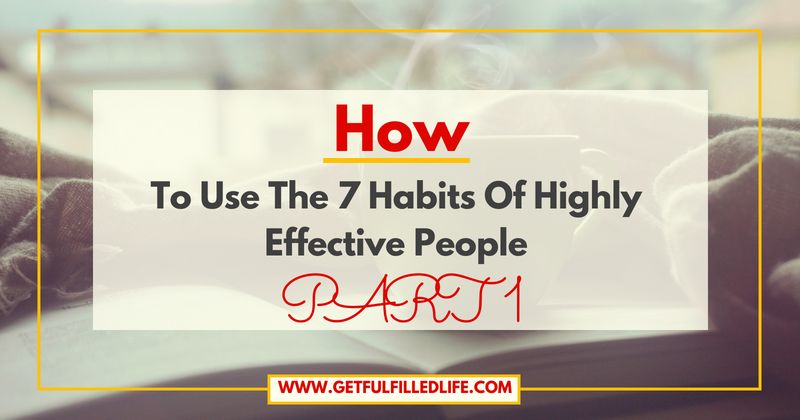The Seven Habits of Highly Effective People is a book I have turned to a number of times for the last fifteen years. This book has had a tremendous impact on my life. Every time I pick it up I get new insights which make my life better. Going by the words of Maya Angelou \”when you learn teach, when you get give\”. For the next weeks in a four-part series, I will summarise the 7 habits and share how you can use them in your life to ensure you become an effective person and live a fulfilled life.
What are the Seven Habits Of Highly Effective People?
When mastered, the habits can have a big bearing on how you live your life. In the words of Covey, “the habits are basic; they are primary. They represent the internalization of correct principles upon which enduring happiness and success are based”. In order to understand and put into practice these habits, you need to have a paradigm shift. In simple terms, a paradigm shift is a way you perceive or interpret what happens in the world. This, in turn, affects the way you think and act.
A paradigm also shows the way you react to what happens to you. We tend to see and view things not as they are but as we are. This explains why sometimes two people may be looking at the same thing but get different perspectives out of it. Our paradigms need to be aligned with principles (fairness, integrity, excellence, honesty, human dignity etc) and natural laws in order for them to function effectively.
These habits help you to move from a place you do not want to be to where you desire to be. Please keep in mind that change will require that you make a complete paradigm shift. You need to be ready to let go of the “this is how I do things” mindset. Instead, you should embrace a new system that will produce your desired results.
In order to create the change you desire, you need to begin by embracing the inside-out approach. This means change should start with you and then spread to others. In Covey’s words “the principles embodied in these habits are already deep within us, in our conscience and common sense. To recognize and develop them, we need to think differently to shift our paradigms to a new, deeper, inside-out level”.
Knowledge, Skill & Desire
Covey defines a habit as “the intersection of knowledge, skill, and desire”. Knowledge has to do with what has to be done and why it is being done. Skill is the how it will be done. Desire covers the motivation to do it. This essentially means you need to want to get it done. When these three are present, then you will be able to create new habits.
The habits move us progressively on a Maturity Continuum from dependence where we start as infants. To Independence as we mature and begin taking responsibility for our lives. Finally, as we grow and realize that no man can live as an island, we move on to interdependence.
Habits 1, 2 & 3 deal with self-mastery. They are what move you from dependence to interdependence. In essence, they require that you do the inner work so that you can win in your relationships with others. As Covey succinctly puts it. \”private victories precede public victories\”. Habits 4, 5, & 6 are the foundations for effective interdependence. They espouse the public victories of teamwork, cooperation, and communication. Habit 7 is about a renewal of the basic dimensions of life. It is the habit of continuous improvement that creates the upward spiral of growth which lifts you to new levels as you continuously practice the habits.
They are habits of effectiveness because they are based on principles. When you master and practice these habits, you will get long lasting results. They will become the basis of your character and act as the roadmap from which you can live your life.
Habit #1 Be Proactive
This habit requires that as a human being, you take responsibility for your own life. You need to always keep in mind that you have the initiative and ability to make things happen. The way you behave should not be dependant on the conditions you find yourself in. Instead, it should be based on how you choose to react to those conditions. Covey sums it up this way the behaviour of proactive people is a product of their own conscious choice which is based on values rather than it being a product of their conditions which is based on feeling.
Proactive people differ from reactive people who are often affected by their physical and social environment. They let what is going on around them stop them from going after the results they want. In simple terms, reactive people are driven by feelings, circumstances, and conditions. Proactive people, on the other hand, are driven by values which are carefully thought about and internalized.
Another distinct feature of proactive people has to do with the words they use. Proactive people take ownership and look for solutions. Reactive people, on the other hand, tend to absolve themselves of responsibility.\” quote=“Proactive people take ownership and look for solutions. Reactive people, on the other hand, tend to absolve themselves of responsibility.”] They tend to say “that is the way I am I cannot do anything about it”. A proactive person, meanwhile, will say “that is something new let me give it a try”.
Circle of Concern/Circle of Influence
Each of us as individuals has got a circle of concern which consists of the things we may be concerned about. These may include our health, family, work environment, the political status of our country etc. As you examine this list, you realize that for some of these things you can have some level of control or influence. You also realize that for others, there is nothing much you can do about them. For example, you can influence the way your family is run as opposed to how your country is run.
Proactive people tend to focus on things they can influence. Due to this, their energy is positive and produces good results. As a result of their actions, they shrink their circle of concern. Reactive people, on the other hand, focus on their circle of concern. They focus on weaknesses of other people or systems, and other things they have no control over. This causes their circle of concern to grow while their circle of influence shrinks.
Another way of looking at these two circles is to consider how people approach change. Reactive people tend to think they will change when they have XYZ. They think that is an outside-in approach. When I have that promotion then I will be happy. Proactive people on the other hand approach change with an inside-out approach. They believe in order for a situation to be different, one has to start by being different. Similarly, they know that if they want to improve a situation, they must work on the one thing they have control over which is themselves. These people also tend to accept the things they cannot control and instead place their efforts and focus on the things they can change.
Finally,
In order to master and practice habit 1 effectively, you need to always remember it is not what happens to you that matters. It is how you choose to react to what has happened. Being proactive will require that you always keep in mind that “it is our willing permission, our consent to what happens to us that hurts us far more than what happens to us in the first place”.
In Part 2, we shall look at Habit 2 (Begin With the End in Mind) and Habit 3 (Put First Things First).
I would love to know what has been your take away from Part 1 of this series. Please share in the comments section. Also please share this series on the social media sites so that together we can become more effective people.


Good overview on the 7 habits!
What do you think about the idea of a third smaller circle inside of influence which is about control…a circle of control if you will.
The idea being that you do have direct control over these things and perhaps they’re what you should be most concerned about.
I like the idea of incorporating control a bit more into the system.
I agree with you Chris on the idea of the third circle especially given the fact that we have the power of choice. We can either choose life or death and our choice definitely does impact on our actions.